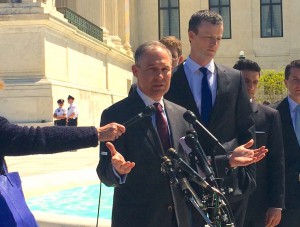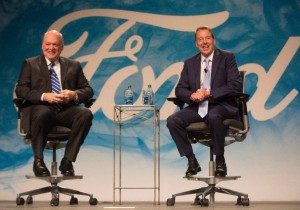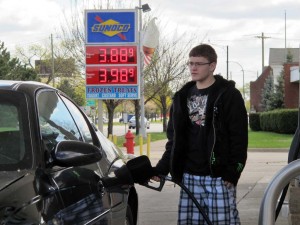A coalition of consumer and environmental groups plans to drive from Washington, D.C. to Detroit this week to deliver over 250,000 signatures demanding that the auto industry — Ford in particular — back off on its call to roll back the Corporate Average Fuel Economy, or CAFE, standards.
If that doesn’t work, a separate coalition, this one comprising 17 states and the District of Columbia, has filed suit against the Environmental Protection Agency to prevent Administrator Scott Pruitt from going ahead with plans to rollback mileage rules established under the Obama Administration. While the EPA hasn’t announced a final plan, a draft resolution indicated it would target something just under 42 miles per gallon, down from the original 2025 target of 54.5 mpg.
“This is about health, it’s about life and death,” California Governor Jerry Brown said last week during a news conference announcing the lawsuit. “This phalanx of states will defend the nation’s clean car standards to boost gas mileage and curb toxic air pollution,” Brown said while referring to the controversial EPA chief as “Outlaw Pruitt.”
As the largest new vehicle market in the country, California has taken a lead on the legal front, though other states suing the EPA include Connecticut, Massachusetts, New Jersey, New York and Pennsylvania.
(Rising demand, shrinking supply causing surge in fuel prices. Click Here for more.)
California has a double reason for trying to block the plan put together by Pruitt and the EPA. The Trump Administration is not only attempting to freeze the phase-in of tougher mileage standards at the target set for 2021, but also to eliminate the special waiver the Golden State has allowing it to set even tougher emissions standards than the rest of the country, part of the original Clean Air Act of 1970. Under that exception, other states can either adopt the federal mandate or opt for California’s target.
A dozen states now have signed onto the tougher mandate. And with them representing almost a third of overall U.S. new vehicle purchases, it’s widely accepted in the industry that manufacturers wouldn’t be able to roll back their mileage goals unless the California waiver is eliminated.
Privately, sources say there has been teeth gnashing among industry leaders who were surprised by how sharply Pruitt’s EPA was ready to roll back the CAFE target. Most had been hoping to see a number in the mid- to high-40 mpg range.
The timing of the EPA move also could prove to be a problem as fuel prices haven’t been this high in several years, and with while the national average is now approaching $3.00 a gallon for regular unleaded, according to tracking service GasBuddy.com, supply shortages have some wondering if the figure could soon approach the $4 range not seen since early in the Obama Administration.
The surge in fuel prices may work to the advantage, in fact, of consumer and environmental groups taking their fight not only to the courts but to the public. Public Citizen, Sierra Club, Greenpeace USA, CREDO and Care2 all plan to arrive in downtown Detroit in time for a 10 AM news conference at the site where Ford Motor Co. was originally incorporated more than 100 years ago. Later in the day, driving a “Dirty Ford,” a 2006 Focus sedan “that has been redesigned to feature a black cloud of pollution suspended on the car’s roof, a tailpipe fog machine and money spewing from the gas tank,” the group plans to deliver 250,000 signatures to Ford World Headquarters in the suburb of Dearborn.
(Are gas station credit cards a smart choice? Click Here to find out.)
The choice of Ford, among Detroit’s Big Three reflects the fact that the automaker has been one of the most vocal in calling for a CAFE rollback, former CEO Mark Fields last year telling then-new President Donald Trump the mileage rules could cost more than 1 million American jobs. More recently, Ford has announced plans to phase out almost its entire passenger car line-up in favor of less energy-efficient SUVs, CUVs and other light trucks.
Despite Fields’ public comments last year, Ford officials have already tried to reposition the company’s stance on CAFE, executive chairman, Bill Ford, and president and chief executive Jim Hackett last week issuing a statement declaring, “We support increasing clean car standards through 2025 and are not asking for a rollback.”
Despite that apparent reversal and comments by several other manufacturers, including Honda and Nissan, that they will continue to aim for the original 54.5 mpg target, the EPA does not appear to be backing off on the CAFE revisions Pruitt has called for.
(Motorists want calmer more comfortable commutes, finds new study. Click Here for more.)




Just out of curiosity, are the people who are angry at Ford and the EPA the same ones who have been buying full-size pick-ups and SUVs? Seems to me, if your vehicle consumes 2 to 4 times the fuel of a Fiat or Fiesta, it is also putting out 2 to 4 times the pollution.
I wonder how many of the 250,000 idiots are driving pick up trucks?
You realize, of course, that support from “idiots” like them is why you’re now seeing pickups getting 30 mpg, SUVs hitting almost 40 and sedans in the 50 mpg range? And why even muscle cars are now getting double their old mileage and eliminating 98%+ of their emissions?
Paul E.
An excellent idea, but apparently not a reality. Every few months (seemingly) thedetroitbureau.com publishes yet another article stating that, despite gradually increasing mileage claims for new vehicles, the average fuel economy for this country is slowly decreasing. If the lowest mileage for new vehicles is 30 mpg, then why is the national average falling? The reason is because, as Dick points out (perhaps a bit harshly), “everyone” is buying, not just pick ups, but full size, fully loaded pick ups and SUVs. The 30 and 40 and 50 mpg claims are for vehicles very few people buy. Because of the (relatively) low cost of fuel, consumers can afford to purchase and operate increasingly larger vehicles. And increasing in size they are, though slowly, I will admit. Therefore, their actual fuel mileage is far below the numbers quoted. Dealer lots are increasingly filled with their largest and most fully equipped offerings. A quick perusal of the window stickers show EPA estimates well below what we would all like to see. The average consumer apparently does not concern themselves with fuel mileage and the resulting effects, but rather with the same ideology they use in purchasing: how much can I afford? As long as gas is cheap, they will continue to buy large.
But it is the attitude of the groups mentioned in the article that concerns me most. It seems to be one of, if we can’t get our government to do what we want them to do, we will attack and smear businesses that don’t follow our ideology. Perhaps that is a bit harsh of me, but businesses are in business to do business. You can’t sell something to someone who has no intention of buying your product. The consumer decides what business will profit from. They want big, not small, so cars are increasingly out and large trucks and SUVs in. And to attack only Ford when GM builds exactly the same kind of vehicle is even more disturbing to me.
This is not a story about the need for clean(er) air. It is a story about lobbyists who are demanding their own way at any cost to anyone other than themselves, and apparently have decided to take their cause not to just the government, but to one manufacturer at a time. Their goal is admirable and necessary, and, given time, it will be the inevitable outcome. It is their current methodology I am troubled with.
Paul, while I agree with you in principle, in reality, the kind of hoops car manufacturers will need to go through to get a fleet mileage average of 54.5 MPG WILL dramatically raise the cost of vehicles.
There is only so much power a single drop of gasoline will produce. All of the low hanging mileage fruit has been picked, what’s left is going to be a LOT harder to obtain.
CT, I have heard that since the first CAFE and emissions laws were passed and, yes, I know prices have gone up…but every single time by only a fraction of what the fear-mongering suggested. No, hitting somewhere in the low-mid 40 mpg range (what CAFE actually calls for after credits and adjustments) is not as insane a demand as you suggest. Remember, traditional gas engines only capture a small amount of the power “a single drop of gasoline will produce.” Automakers have already shown they can boost efficiency by double-digit levels from today’s already good numbers, even without electrification or with marginal amounts. micros, hybrids, PHEVs and BEVs will take things a long way. As to low-hanging fruit, I just searched for that phrase on my personal story database, which goes back to 1985 or so. Should I tell you the first time I was told that by automakers? Color me skeptical that 54.5 can’t be done without killing a million jobs, as automakers tried to argue just a year ago. There’s a reason they’re backing down…because some carmakers –read Honda, Toyota and Nissan, among them — are planning to make the target, whatever Ford and GM and FCA do.
Paul E.